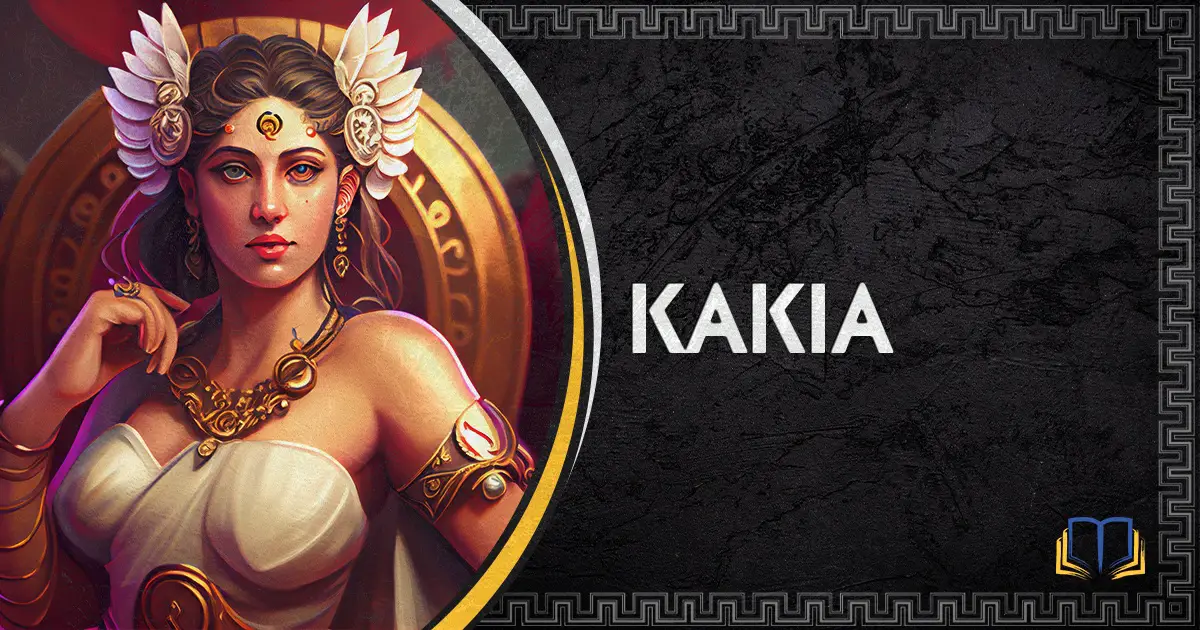Kakia is a fascinating and complex figure in Greek mythology, representing the dangers of vice and the importance of virtue. With her persuasive and manipulative nature, Kakia was known for trying to tempt people towards indulging in immorality and abandoning their sense of morality.
Despite her negative influence, however, Kakia also served as a cautionary tale, reminding people of the importance of avoiding wickedness and pursuing lives of excellence and virtue.
In this article, we will delve into the story of Kakia and explore the enduring lessons that she offers us about the struggles between good and evil and the importance of making virtuous choices.
Also don’t forget to check out our Greek Mythology hub for all things related to Greek Mythology.
Who Is Kakia in Greek Mythology?
In Greek mythology, Kakia (Cacia in Latin) was the goddess of vice and moral badness. She persuaded and manipulated people to achieve her hidden ill intentions.
Kakia represented all that was undesirable in terms of character and morals, including indulgence, ugliness, bad reputations, bad ancestry, and indigence. People often depicted her as lazy, untrustworthy, and unfit for purpose.
Kakia was the complete opposite of Areté, the Greek goddess of excellence and virtue.
While Areté embodied all that was admirable and worthy of pursuit, Kakia represented the pitfalls and dangers of indulging in vices and letting moral decay take hold.
Despite her negative connotations, Kakia was an important figure in Greek mythology. She served as a cautionary tale in Greek mythology, reminding people of the importance of living a virtuous and upright life.
Attributes of Kakia
Kakia was often depicted as a vain and heavily made-up woman, with a tendency to be overweight and wear revealing clothing. She also loved extravagance and often wore too much jewelry.
Despite her physical appearance, Kakia was a seductive temptress who exuded confidence, pride, and selfishness.
She tried to ruin the efforts of other gods to bring goodness and justice to mortals, using her persuasive and manipulative nature to sway people towards indulging in vice and immorality.
Family of Kakia
There is no clear information about Kakia’s family in Greek mythology, though it is possible that she was a daughter of Nyx, the Greek goddess of the night and a primordial deity who was the mother of various other deities including the Fates, Sleep, Death, Strife, and Pain.
However, this is not stated definitively in any myths or stories.
According to some Gnostic texts, Kakia was the child of the first angel and Authadia, and had siblings including Zelos, Phthonus, Erinnys, and Epithymia. It is unclear how these figures fit into the broader pantheon of Greek gods and goddesses, or how they may have interacted with Kakia.
Kakia in The Choice of Hercules
Kakia is known for trying to tempt people to be evil, and her most famous temptation is the one where she tries to get Heracles to join her side. This story is mentioned in a couple of ancient texts, like Xenophon’s Memoribilia and Philostratus’ Life of Apollonius of Tyana.
Here is a brief quote:
Now when Heracles heard this, he asked, “Lady, pray what is your name?”
“My friends call me Happiness,” she said, “but among those that hate me I am nicknamed Kakia.
—This passage can be found in Memorabilia 2.1.25-26.
In this story, Kakia offers Heracles an easy life without any problems, while Areté offers a harder but more fulfilling path. When Kakia shows her true colors to Heracles, he sees through her lies and chooses Areté’s offer instead. He chooses the more challenging but ultimately more rewarding life of virtue and excellence over one of laziness and indulgence.
This story is a good reminder to be careful of false promises and to choose the path that may be harder but is ultimately more fulfilling. It also shows the eternal struggle between good and evil and how temptation can lead us down the wrong path.
Be sure to check out my breakdown of this story here.
Also, I’ve written an entire short story based on The Choice of Hercules, which you should definitely check out as well!

This is a short story that takes place in Greek Mythology (and is part of my shared universe of mythic stories).
It’s a faithful adaptation of a little-known myth that is perhaps my favorite about Hercules. Check it out!
Final Thoughts
Throughout history, the Greeks tried to avoid following Kakia’s path and instead pursued lives of Arete.
However, it is important to recognize that some individuals inevitably succumb to temptation and follow Kakia’s path towards vice and immorality.
Ultimately, the lessons of Kakia continue to be relevant today, reminding us of the enduring struggle between good and evil and the importance of making virtuous choices.


